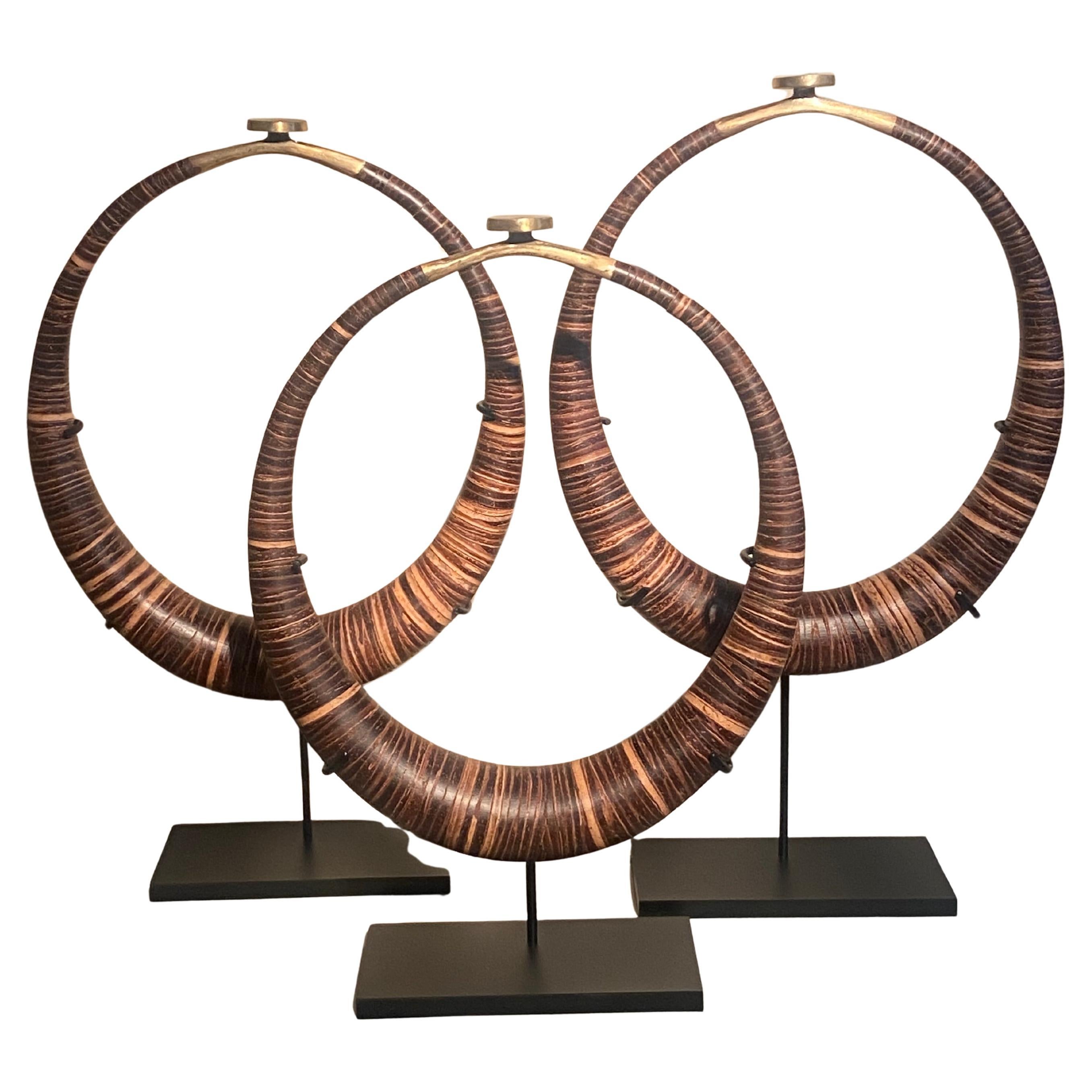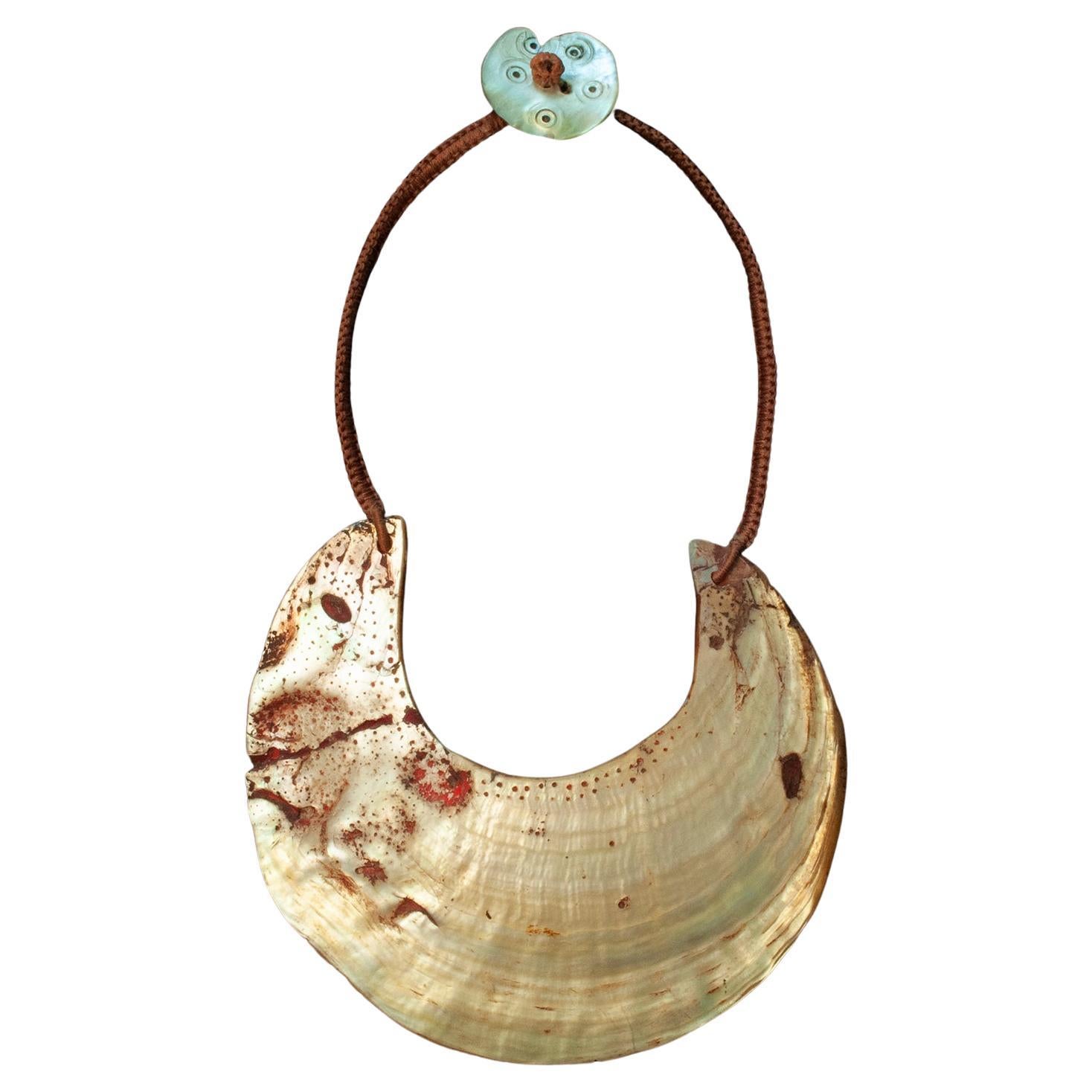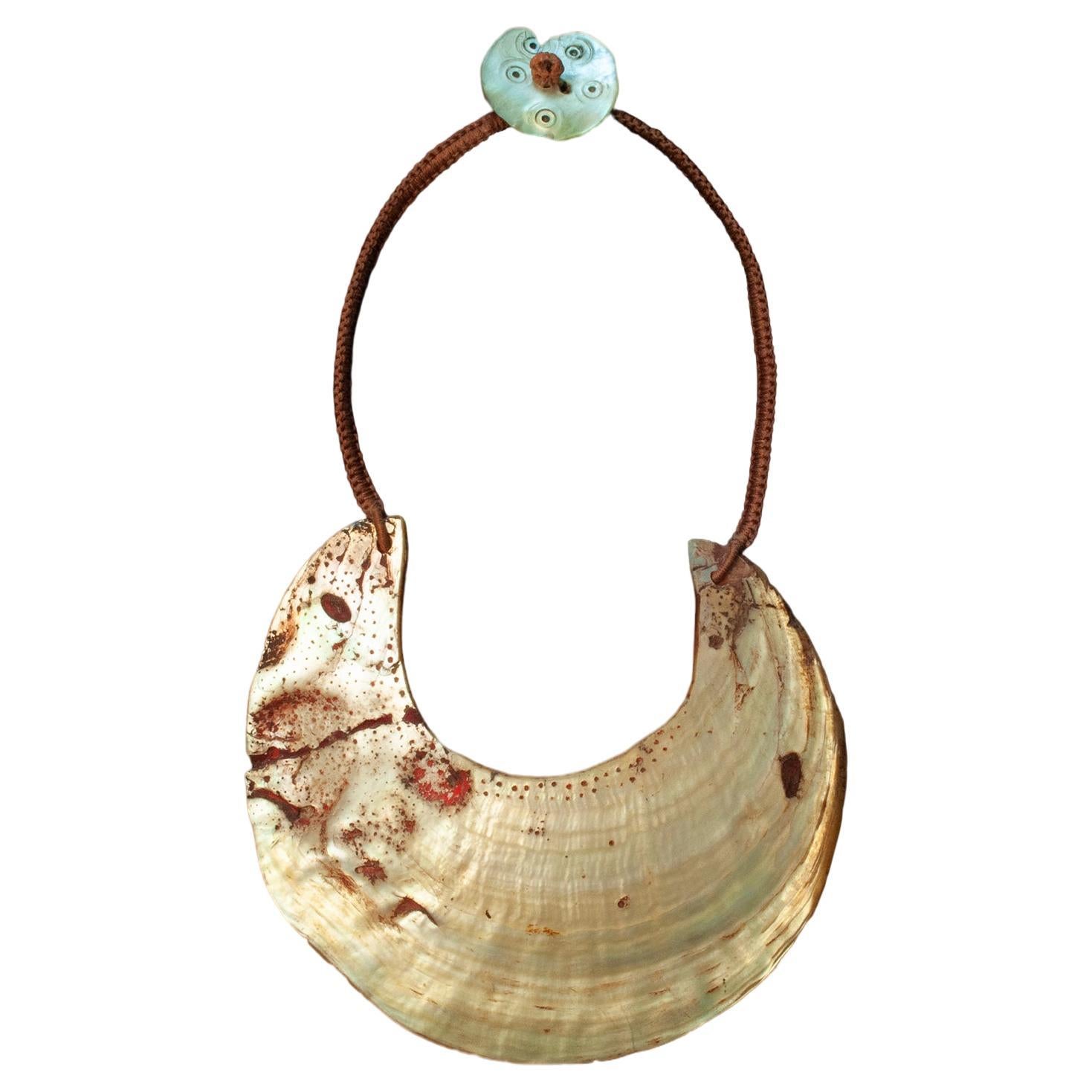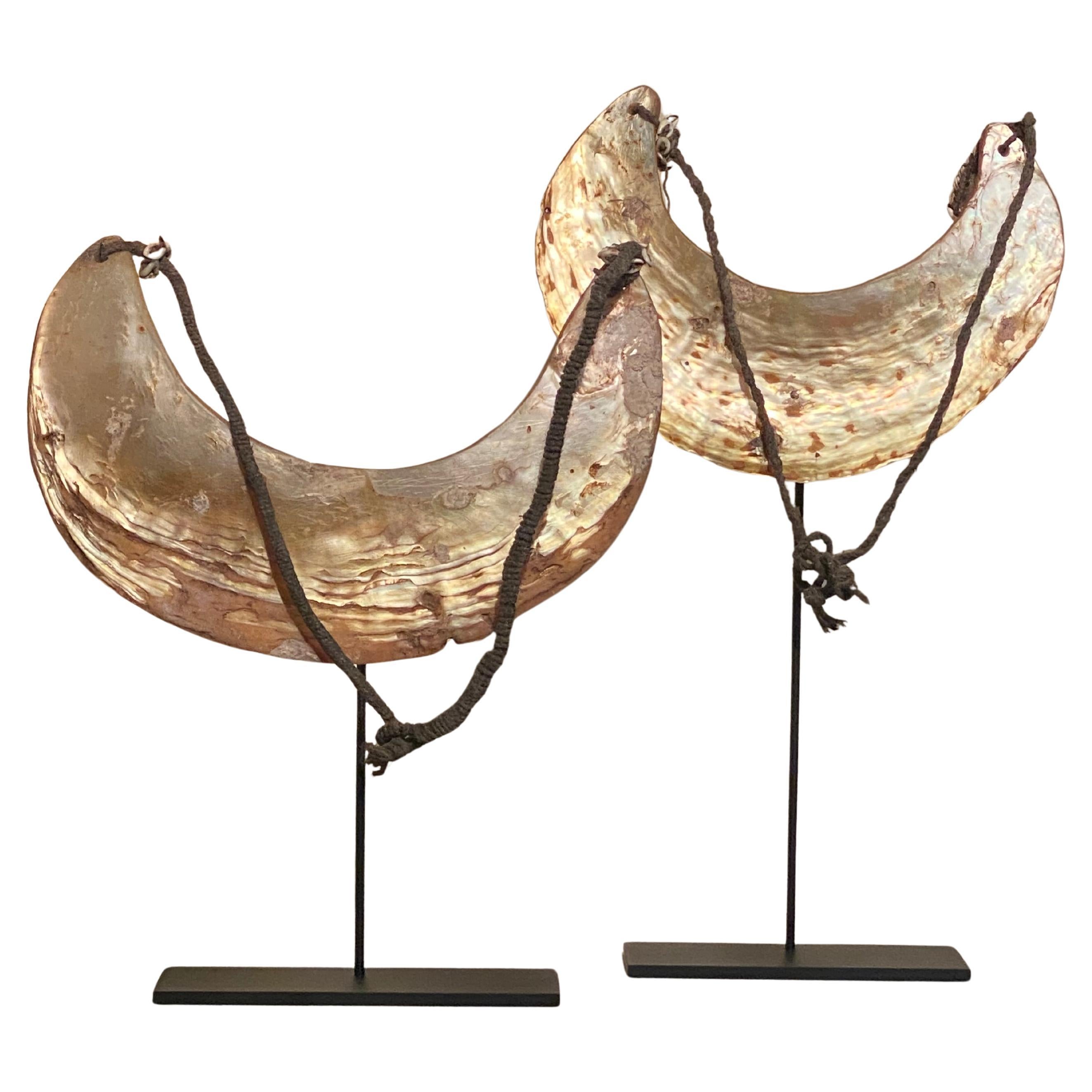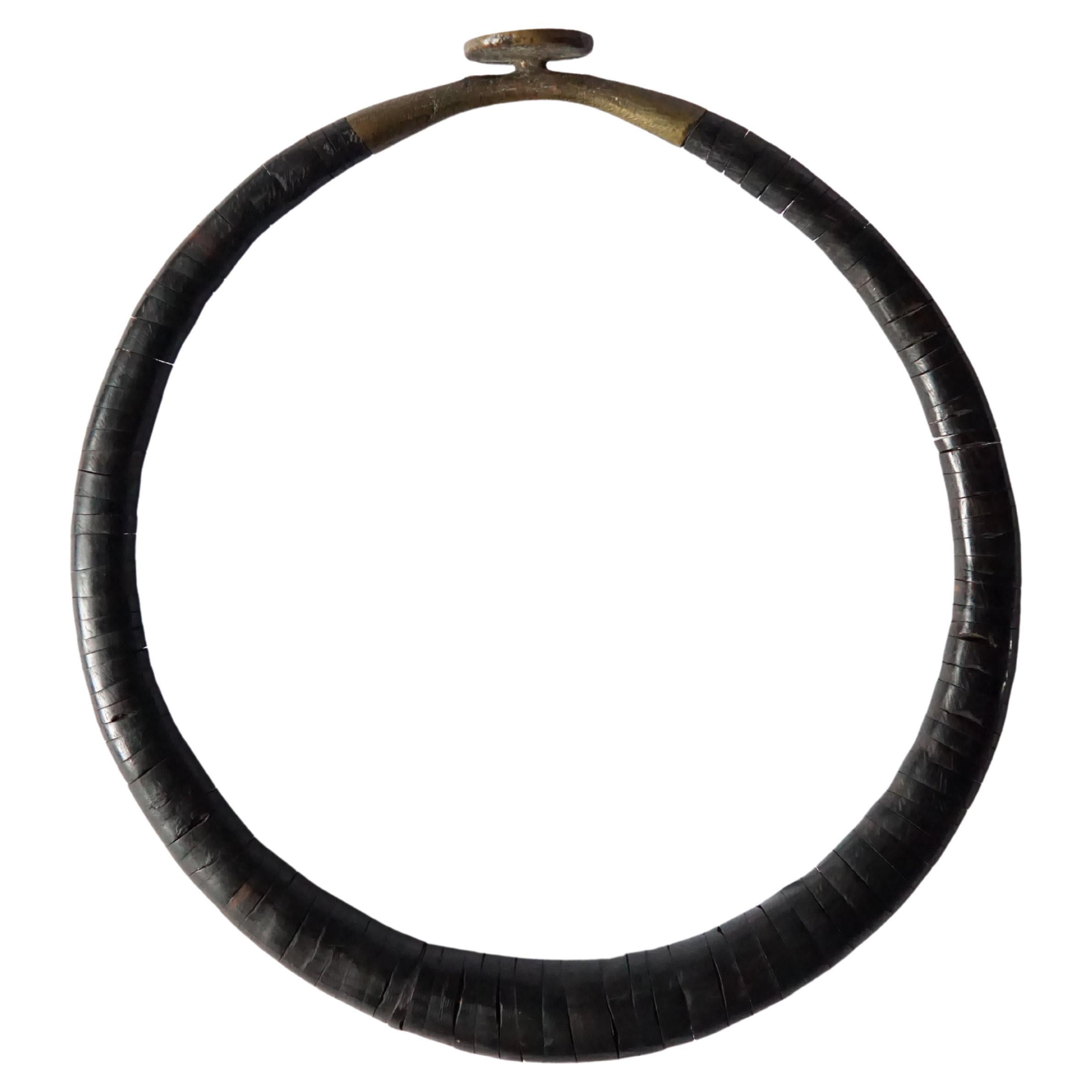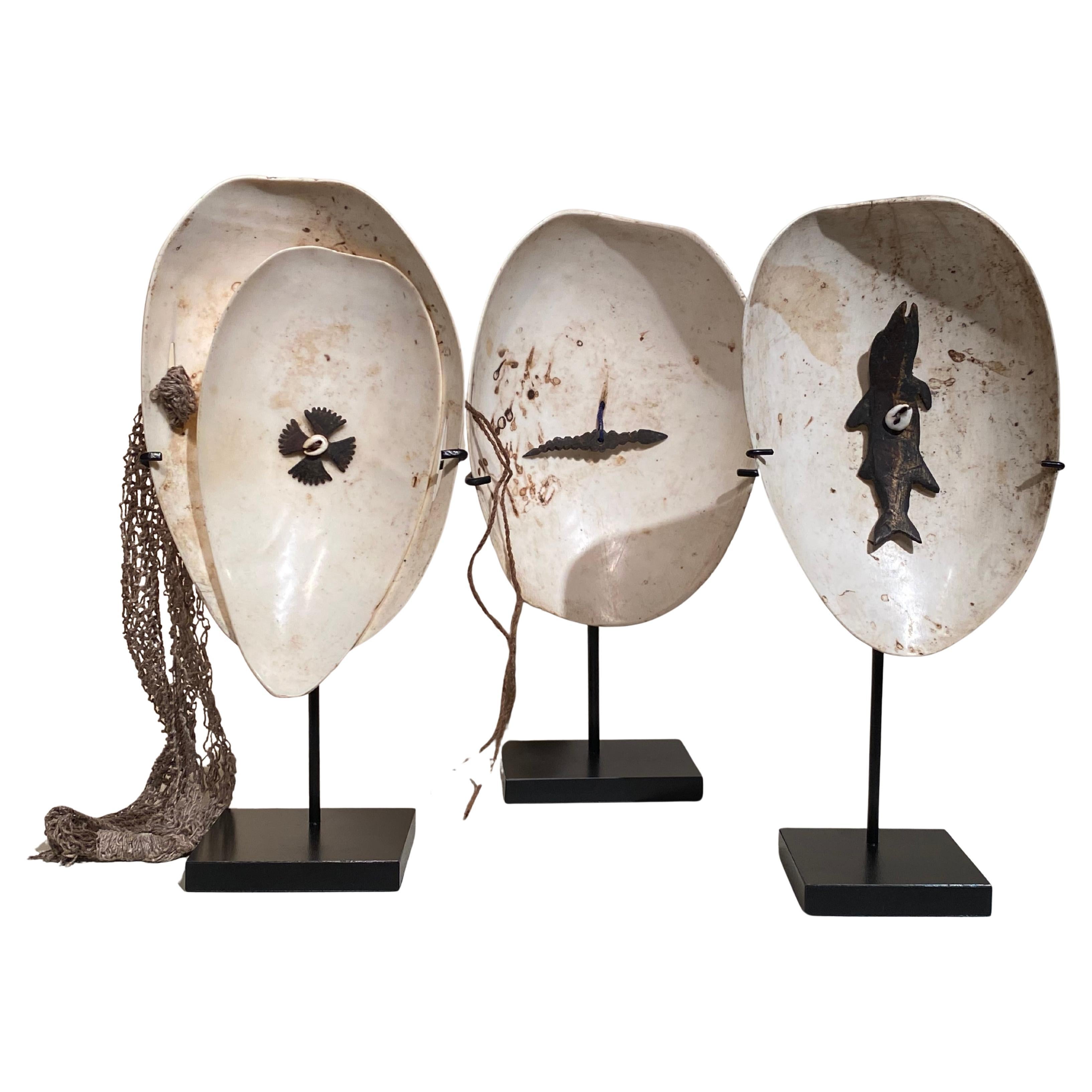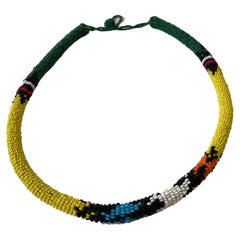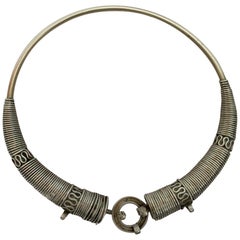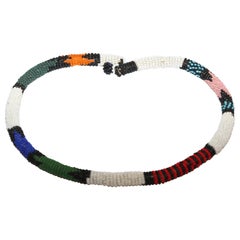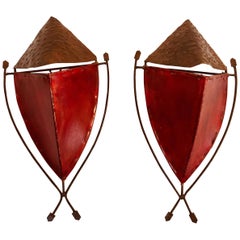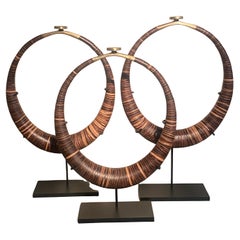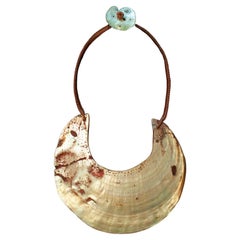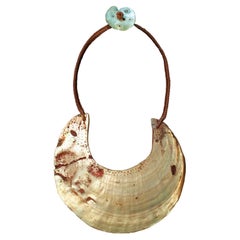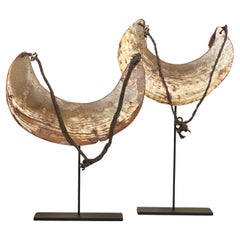Items Similar to Antique Ethnic Tribal Kina Crescent Shell Necklaces Papua New Guinea Set of 3
Video Loading
Want more images or videos?
Request additional images or videos from the seller
1 of 22
Antique Ethnic Tribal Kina Crescent Shell Necklaces Papua New Guinea Set of 3
$750per set
£569.08per set
€650.70per set
CA$1,047.55per set
A$1,164.73per set
CHF 608.16per set
MX$14,177.59per set
NOK 7,759.82per set
SEK 7,270.58per set
DKK 4,856.26per set
Shipping
Retrieving quote...The 1stDibs Promise:
Authenticity Guarantee,
Money-Back Guarantee,
24-Hour Cancellation
About the Item
Antique Collectible Ethnic Tribal Folk Art Crescent Shell Pieces Choker Necklaces from Papua New Guinea.
Shell pieces cut from the gold lipped pearl oyster found off the waters of Papua New Guinea.
Their opalescent color ranges from deep gold yellow to pale yellow.
Each is pierced at the crescent point for a cord attachment enabling the owner to wear them singly or together around the neck.
One had a line of holes along the inner edge of the crescent as a decorative feature.
Highly Collectible Museum Pieces, worn by men and women rare old Kina Shell Necklaces (Huge Mother of Pearl Crescent) Pectoral Collected from the Foi Tribe (Papua New Guinea), Circa 1920’s.
From the Art collection of Marian and John Scott.
Acquisition date: 1969.
Evaluation date records: 1982.
About: For the people of the Highlands, shells were considered treasures. As they were items that came from distant shores of Papua New Guinea they were already objects used for trade. The number one source of mother of pearl wealth was and is still is from the Thursday Island, one of the chain of Island that suggests the ancient land bridge across the Torres Straits from Cape York, Australia to New Guinea. They were fashioned into objects of adornment worn on costumes, hair, nose, etc.
Of particular rarity was the gold lipped pearl shell.
References: Plumes and Arrows, Inside New Guinea, COlin Simpson, Angus and RObertson, 1968.
CATEGORY
Anthropology: Ethnography.
Tribal Kina Shell Pectoral Necklace, Pearl shell ornamentation (neck).
Kina (shell money) Oject part of Pacific Cultures Collections.
Purchased from the amazing private collection of Mark Lissauer who spent his life collecting niche ethnographic pieces.
About Mark Lissauer:
Mark Lissauer spent forty years travelling abroad for months at a time collecting ethnographic artefacts primarily from New Guinea and the islands of the West Pacific, and from Asia and Himalayan countries. Fluent in five languages and having in the course of business travelled to more than forty countries, Mark is well-known to museums and art-collectors around the world for his long career and his interesting and diverse collection of rare ethnographic material.
Mark knows the origin and symbolism of each piece. Through extensive research and more than ninety trips around the globe, Mark familiarised himself with the traditions of the various cultures he visited in order to understand the meaning of each object to its region and tribe. His home has a specialist library and several rooms are filled with tribal carvings, textiles and ethnographica.
He acquired his first tribal piece in 1948 during a business trip to Milne Bay, New Guinea, and has since documented the acquisition of some 35,000 items. Several thousands of these have been sold to important private collections and museums worldwide, including the Rockefeller Museum, the British Museum and the Musée National des Arts d’Afrique et d’Océanie, now incorporated into the Louvre Museum.
Estimator certificate of authenticity by Wayne Heathcote Tribal Art Dealer and Expert.
Heathcote has a flash gallery in Brussels, where much of the tribal art business is centred, and is an expert at Sotheby's tribal art sale, one of two it holds each year in New York.
Many of the pieces in the sale also bore his provenance, proudly stated by vendors in the catalogue.
- Dimensions:Height: 1 in (2.54 cm)Diameter: 7.5 in (19.05 cm)
- Sold As:Set of 3
- Style:Tribal (In the Style Of)
- Materials and Techniques:
- Place of Origin:Papua New Guinea
- Period:
- Date of Manufacture:1920
- Condition:Wear consistent with age and use.
- Seller Location:North Hollywood, CA
- Reference Number:Seller: ETS12231stDibs: LU906837646912
About the Seller
5.0
Platinum Seller
Premium sellers with a 4.7+ rating and 24-hour response times
1stDibs seller since 2011
3,060 sales on 1stDibs
Typical response time: 1 hour
- ShippingRetrieving quote...Shipping from: North Hollywood, CA
- Return Policy
Authenticity Guarantee
In the unlikely event there’s an issue with an item’s authenticity, contact us within 1 year for a full refund. DetailsMoney-Back Guarantee
If your item is not as described, is damaged in transit, or does not arrive, contact us within 7 days for a full refund. Details24-Hour Cancellation
You have a 24-hour grace period in which to reconsider your purchase, with no questions asked.Vetted Professional Sellers
Our world-class sellers must adhere to strict standards for service and quality, maintaining the integrity of our listings.Price-Match Guarantee
If you find that a seller listed the same item for a lower price elsewhere, we’ll match it.Trusted Global Delivery
Our best-in-class carrier network provides specialized shipping options worldwide, including custom delivery.More From This Seller
View AllVintage African Urembo Beaded Necklace Choker Kenya
Located in North Hollywood, CA
African Urembo Beaded vintage necklace choker by the Maasai Tribe Kenya
Vintage African Urembo beaded necklace choker.
Handmade in Kenya by the ...
Category
Late 20th Century Kenyan Folk Art Collectible Jewelry
Materials
Beads
Traditional Silver Torque Necklace Chocker from Rajasthan India
Located in North Hollywood, CA
Traditional torque or Hansuli silvered necklace choker from Lambadi or Banjara and Sugali People, Andhra Pradesh, India.t India, circa 1940.
Fabulous vi...
Category
Early 20th Century Indian Folk Art Tribal Art
Materials
Metal, Silver Plate
African Urembo Beaded Vintage Necklace Choker by the Maasai Tribe Kenya
Located in North Hollywood, CA
Vintage African Urembo beaded necklace choker.
Handmade in Kenya by the maasai tribe.
Urembo means “beauty” and the handmade pattern and unique ...
Category
Late 20th Century Kenyan Folk Art Collectible Jewelry
Materials
Beads
African Tribal Art Mask Parchment Wall Shade Sconces in Red
Located in North Hollywood, CA
Pair of African Tribal Art mask parchment wall shade sconces.
These Art pieces could be used as large wall lamp shade.
Iron frame covered with hide w...
Category
Early 20th Century Moroccan Folk Art Wall Lights and Sconces
Materials
Iron
Large Moroccan Tribal Art Parchment Wall Shade Sconce
By Berber Tribes of Morocco
Located in North Hollywood, CA
Large pair of African Tribal Art parchment wall shade sconce featuring a large triangle hide form stitched on iron and hand painted surface.
These art piec...
Category
20th Century Moroccan Folk Art Wall Lights and Sconces
Materials
Iron
Antique Brass Baby Rattle Whistle Bell Dangles, India
Located in North Hollywood, CA
Antique brass baby rattle whistle bell dangles, India.
Handcrafted baby rattle in openwork designs with whistle handle and three decorative bell dangles.
...
Category
Mid-20th Century Indian Folk Art Metalwork
Materials
Brass
You May Also Like
Set of 3 Tribal Necklaces
Located in Schellebelle, BE
Beautiful set of 3 Necklaces from Indonesia, from the Nias Island,
a Kalabubu headhunters Torque,
made out of small rings of Coconut and Copper,
very decorative objects,
36 cm high x...
Category
Vintage 1980s Indonesian Tribal Art
Materials
Coconut
$2,599 / set
20th Century Tribal Kina Shell Necklace, Papua New Guinea
Located in Point Richmond, CA
20th Century Tribal Kina Shell Necklace, Papua New Guinea
Kina shells were traditionally worn in the western highlands of Papua New Guinea as pectorals, either with a fiber strap or...
Category
Mid-20th Century Papua New Guinean Artisan Pendant Necklaces
20th Century Tribal Kina Shell Pectoral Necklace by Unknown Jeweler
Located in Point Richmond, CA
20th Century Tribal Kina Shell Pectoral Necklace by unknown jeweler
Kina shells were traditionally worn in the western highlands of Papua New Guinea as pectorals, either with a fibe...
Category
Late 20th Century American Tribal Tribal Art
Materials
Shell
Pair of Papua New Guinea Necklaces
Located in Schellebelle, BE
An elegant pair of Necklaces from Papua New Guinea,
made of Mother of Pearl Shell,
good, old patina and shine of the shells,
nice decorations with small shells and fibres,
nice colle...
Category
Vintage 1960s Asian Tribal Art
Materials
Shell
$2,008 / set
Nias 'Kalabubu' Coconut & Brass Headhunter Necklace
Located in Jimbaran, Bali
This 'Kalabubu' necklace, also known as the 'head-hunter' necklace made out of coconut and brass is the most important ornament for the men of Southern Nias Island, North Sumatra...
Category
Early 20th Century Indonesian Tribal Tribal Art
Materials
Brass
Exceptional set of 3 Ceremonial Objects from Papua New Guinea
Located in Schellebelle, BE
An exceptional set of 3 Shell objects from Papua New Guinea,
made as ornaments used in the hair or as decoration of the body,
decorated with hand carved figures made out of coconut o...
Category
Vintage 1970s Asian Tribal Art
Materials
Shell
More Ways To Browse
Antique Shell Collection
Ethnic Jewellery
Ethnic Jewelry
Ethnic Antique
Ethnic Textiles
Antique Collectables Australia
Antique Jewelry Australia
Australian Antiques
Gold Tribal Jewellery
Tribal Art Antiques
Pierce Arrow
Abalone Shell Jewellery
1920s Costume Jewelry
Oyster Necklace
Asian Arrow
Library Globe
Shell Money
1948 Necklace
